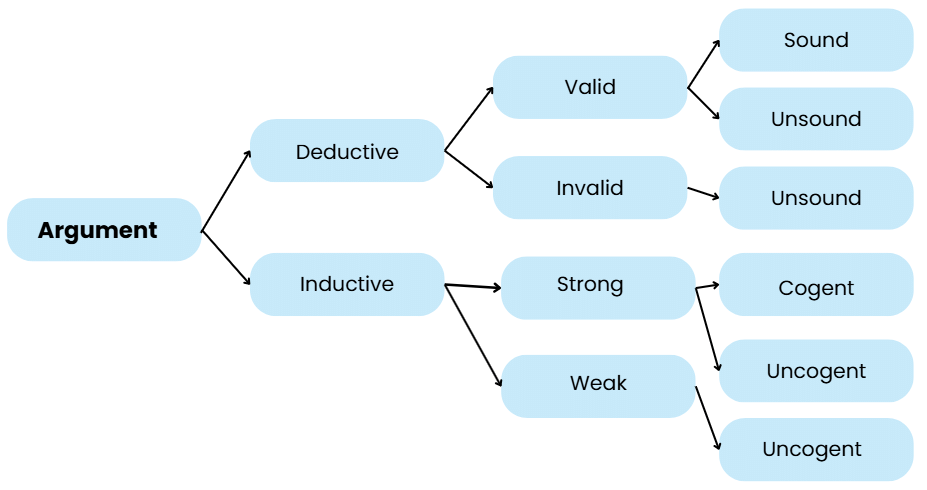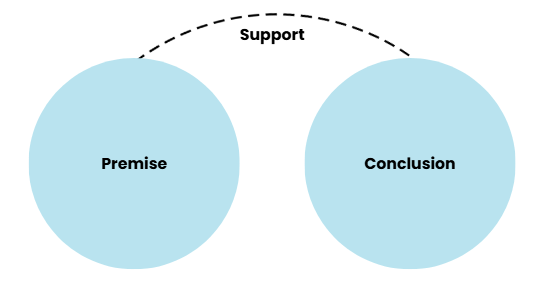Structure of Arguments | Logical Reasoning for UGC NET PDF Download
| Table of contents |

|
| Structure of Arguments |

|
| Central Parts of an Argument |

|
| Forms of Argument |

|
| Examples |

|
Structure of Arguments
An argument is defined as a series of statements known as premises that are said to support a conclusion. In simple language, an argument is a point of view on a particular matter supported by certain evidence.

Central Parts of an Argument
Premise
A premise of an argument is something that is put forth as a truth, but is not proven.
Examples: This is a beautiful car. ;The people of this town are angry.
If you are not satisfied with another person's argument, you can challenge the truth of their premises. The more complex the premise, the more opportunity there is to challenge it.

Conclusion
A conclusion is the statement that is reasoned or inferred from the argument's premises. For example, "We need to get out."
- Conclusions are derived from premises.
- They represent the logical endpoint of an argument.
- Conclusions are essential for decision-making and problem-solving.
Forms of Argument
The structure of argument can be further divided into three categories namely deductive, inductive, and abductive.

Deductive Argument
- A deductive argument is a way of reasoning where the conclusion is directly based on the premises.
- The goal is to provide clear proof for the conclusion.
- If the premises are true, then the conclusion must also be true.
- Deductive arguments are known for their validity, meaning the conclusion logically follows from the premises.
- Example:
- Premise 1: All mammals are warm-blooded animals.
- Premise 2: A whale is a mammal.
- Conclusion: Therefore, a whale is a warm-blooded animal.
Inductive Argument
- An inductive argument is a type of reasoning where the conclusion is based on patterns, trends, or evidence observed.
- The aim is to suggest a likely truth for the conclusion.
- Inductive reasoning does not guarantee certainty; it relies on the strength of the evidence.
- Example:
- Premise 1: Every cat I have seen has fur.
- Conclusion: Therefore, all cats have fur.
- This conclusion is based on personal observations but does not ensure that every cat has fur, as there could be exceptions.
Abductive Argument
- Abductive reasoning is about finding the best explanation for a set of observations or evidence.
- The goal is to identify the most likely hypothesis that explains the facts.
- This reasoning often uses the hypothetico-deductive method, proposing a hypothesis and making predictions based on it.
- These predictions are then tested to see if the hypothesis is valid.
- Example:
- Observation: The ground is wet.
- Hypothesis: It rained last night.
- Prediction: If it rained last night, there should be puddles on the streets.
Examples
Example Argument 1 : Premise 1: All humans are mortal. Premise 2: Socrates is a human. Conclusion: Therefore, Socrates is mortal.
Question 1: Identify the conclusion in the argument. a) All humans are mortal. b) Socrates is a human. c) Therefore, Socrates is mortal. d) Socrates is a philosopher.
Answer: c) Therefore, Socrates is mortal.
Solution: The conclusion is the statement that the premises are intended to support. Here, "Therefore, Socrates is mortal" is the conclusion drawn from the premises.
Example Argument 2 : Premise 1: Regular exercise improves mental health. Premise 2: Improved mental health leads to better academic performance. Conclusion: Therefore, regular exercise leads to better academic performance.
Question 2: Which of the following is a premise in the argument? a) Regular exercise leads to better academic performance. b) Regular exercise improves mental health. c) Academic performance is important. d) Better academic performance requires effort.
Answer: b) Regular exercise improves mental health.
Solution: Premises provide the supporting evidence for the conclusion. Here, "Regular exercise improves mental health" is a premise that supports the argument's conclusion.
|
31 videos|44 docs|14 tests
|
FAQs on Structure of Arguments - Logical Reasoning for UGC NET
| 1. What are the central parts of an argument? |  |
| 2. What is the difference between deductive and inductive reasoning? |  |
| 3. Can you provide an example of a deductive argument? |  |
| 4. What is an example of inductive reasoning? |  |
| 5. How can one identify a strong argument? |  |




















